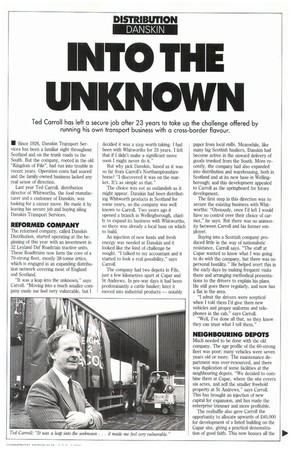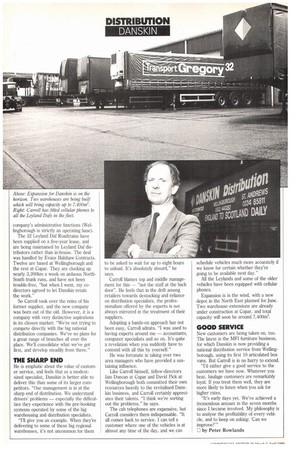INTO THE UNKNOWN
Page 45

Page 46

If you've noticed an error in this article please click here to report it so we can fix it.
Ted Carroll has left a secure job after 23 years to take up the challenge offered by running his own transport business with a cross-border flavour.
• Since 1926, Danskin Transport Services has been a familiar sight throughout Scotland and on the trunk roads to the South. But the company, rooted in the old "Kingdom of Fife", had run into trouble in recent years. Operation costs had soared and the family-owned business lacked any real sense of direction.
Last year Ted Carroll, distribution director of Whitworths, the food manufacturer and a customer of Danskin, was looking for a career move. He made it by leaving his secure job and buying ailing Danskin Transport Services.
REFORMED COMPANY
The relorrned company, called Danskin Distribution, started operating at the beginning of this year with an investment in 32 Leyland Daf Roadtrain tractive units. These Roadtrains now form the core of a 70-strong fleet, mostly 38-tonne artics, which is engaged in an expanding distribution network covering most of England and Scotland.
"It was a leap into the unknown," says Carroll. "Moving into a much smaller company made me feel very vulnerable, but I decided it was a step worth taking. I had 'been with Whitworths for 23 years. I felt that if I didn't make a significant move soon I might never do it."
But why pick Danskin, based as it was so far from Carroll's Northamptonshire home? "I discovered it was on the market. It's as simple as that."
The choice was not as outlandish as it might appear. Danskin had been distributing Whitworth products in Scotland for some years, so the company was well known to Carroll. Two years ago it opened a branch in Wellingborough, chiefly to expand its business with Whitworths, so there was already a local base on which to build.
An injection of new funds and fresh energy was needed at Danskin and it looked like the kind of challenge he sought. "I talked to my accountant and it started to look a real possibility," says Carroll.
The company had two depots in Fife, just a few kilometres apart at Cupar and St Andrews. In pre-war days it had been predominantly a cattle haulier; later it moved into industrial products — notably paper from local mills. Meanwhile, like many big Scottish hauliers, Danskin had become active in the onward delivery of goods trunked from the South. More recently, the company had also expanded into distribution and warehousing, both in Scotland and at its new base in Wellingborough; and this development appealed to Carroll as the springboard for future development.
The first step in this direction was to secure the existing business with Whitworths: "Obviously, once I'd left I would have no control over their choice of carrier," he says. But there was no animosity between Carroll and his former employer.
Buying into a Scottish company produced little in the way of nationalistic resistance, Carroll says. "The staff at Cupar wanted to know what I was going to do with the company, but there was no personal hostility." He helped avert this in the early days by making frequent visits there and arranging methodical presentations to the drivers to explain his plans. He still goes there regularly, and now has a flat in the area.
"I admit the drivers were sceptical when I told them I'd give them new vehicles and proper uniforms and telephones in the cab," says Carroll.
"Well, I've done all that, so they know they can trust what I tell them."
NEIGHBOURING DEPOTS
Much needed to be done with the old company. The age profile of the 60-strong fleet was poor; many vehicles were seven years old or more. The maintenance department was over-resourced, and there was duplication of some facilities at the neighbouring depots. "We decided to combine them at Cupar, where the site covers six acres, and sell the smaller freehold property at St Andrews," says Carroll. This has brought an injection of new capital for expansion, and has made the enterprise trimmer and more profitable.
The reshuffle also gave Carroll the opportunity to allocate upwards of 240,000 for development of a listed building on the Cupar site, giving a practical demonstration of good faith. This now houses all the company's administrative functions (Wellingborough is strictly an operating base).
The 32 Leyland Daf Roadtrains have been supplied on a five-year lease, and are being maintained by Leyland Daf distributors rather than in-house. The deal was handled by Evans Halshaw Contracts. Twelve are based at Wellingborough and the rest at Cupar. They are clocking up nearly 3,200Iun a week on arduous NorthSouth trunk runs, and have not been trouble-free, "but when I went, my codirectors agreed to let Danskin retain the work," So Carroll took over the reins of his former supplier, and the new company was born out of the old. However, it is a company with very distinctive aspirations in its chosen market: "We're not trying to compete directly with the big national distribution companies. We've no plans for a great range of branches all over the place. We'll consolidate what we've got first, and develop steadily from there."
THE SHARP END
He is emphatic about the value of customer service, and feels that as a modestsized specialist, Danskin is better able to deliver this than some of its larger competitors. "Our management is in at the sharp end of distribution. We understand drivers' problems — especially the difficulties they experience with the pre-booking systems operated by some of the big warehousing and distribution specialists.
"I'll give you an example. When they're delivering to some of these big regional warehouses, it's not uncommon for them to be asked to wait for up to eight hours to unload. It's absolutely absurd," he says.
Carroll blames top and middle management for this — "not the staff at the back door". He feels that in the drift among retailers towards destocking and reliance on distribution specialists, the professionalism offered by the experts is not always mirrored in the treatment of their suppliers.
Adopting a hands-on approach has not been easy, Carroll admits. "I was used to having experts around me — accountants, computer specialists and so on. It's quite a revelation when you suddenly have to contend with all this by yourself."
He was fortunate in taking over two area managers who have provided a sustaining influence.
Like Carroll himself, fellow-directors lain Duncan at Cupar and David Pick at Wellingborough both committed their own resources heavily to the revitalised Danskin business, and Carroll certainly appreciates their talents. "I think we're sorting out the problems," he says.
The cab telephones are expensive, but Carroll considers them indispensable. "It all comes back to service. I can tell a customer where one of the vehicles is at almost any time of the day, and we can schedule vehicles much more accurately if we know for certain whether they're going to be available next day," All the Leylands and some of the older vehicles have been equipped with cellular phones.
Expansion is in the wind, with a new depot in the North East planned for June, Two warehouse extensions are already under construction at Cupar, and total capacity will soon be around 7,400m2.
GOOD SERVICE
New customers are being taken on, too. The latest is the MFI furniture business, for which Danskin is now providing a national distribution service from Wellingborough, using its first 10 articulated box vans. But Carroll is in no hurry to extend.
"I'd rather give a good service to the customers we have now. Whatever you hear, haulage customers are remarkably loyal. If you treat them well, they are more likely to listen when you ask for higher rates.
"It's early days yet. We've achieved a tremendous amount in the seven months since I became involved. My philosophy is to analyse the profitability of every vehicle, and to keep on asking: 'Can we improve?"
0 by Peter Rowlands








































































































































